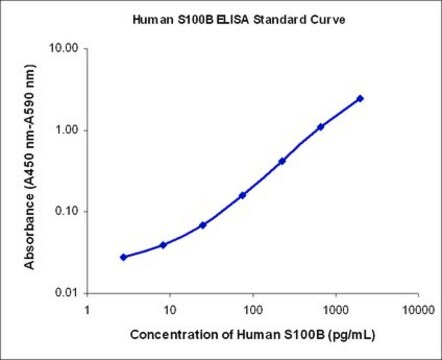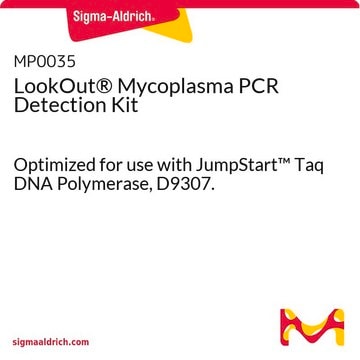推薦產品
product name
磷酸化神经丝(pNF-H)夹心ELISA试剂盒, The Phosphorylated Neurofilament H (pNF-H) kit is a sandwich enzyme immunoassay (EIA), which measures pNF-H.
品質等級
物種活性
pig, feline, rat, human, bovine, mouse
製造商/商標名
Chemicon®
assay range
sensitivity: 0.0293-15 ng/mL
(Range of Detection)
sensitivity: 0.0585 ng/mL
技術
ELISA: suitable
NCBI登錄號
UniProt登錄號
應用
research use
檢測方法
colorimetric
運輸包裝
dry ice
應用
用于检测/量化:磷酸化神经丝(pNF-H)
研究类别
神经科学
神经科学
磷酸化神经丝H(pNF-H)试剂盒是一种夹心酶免疫测定法(EIA),可测量pNF-H。
包裝
96孔
成分
鸡抗-pNF-H多克隆抗体预包被的免疫板:(部件号2006263)。一个预先包被有鸡抗pNF-H多克隆抗体的96孔免疫板,密封在铝箔袋中。
兔抗pNF-H多克隆抗体:(部件号2006919)。一瓶(100 μL)兔抗pNF-H多克隆抗体。
山羊抗兔碱性磷酸酶偶联抗体:(部件号2006917)。一瓶(10 μL)山羊抗兔碱性磷酸酶结合物。
牛pNF-H标准品:(部件号2006918)。一瓶(5.0 ng)牛pNF-H标准品。
20X TBS:(部件号2004913)。一瓶(50 mL)20X TBS。
20% 吐温-20® :(部件号2004915)。一瓶(3 mL)20% 吐温-20。
Elisa检测稀释剂:(部件号2006921)一瓶(30 mL)Elisa检测稀释剂,含有0.05%Kathon作为防腐剂,以即用型形式提供。
pNPP缓冲液:(部件号2006261)。一瓶(12 mL)pNPP缓冲液,与50X p-NPP一起使用,以即用型形式提供。
50X pNPP:(部件号2006262)。一瓶(250 μL)50X pNPP(对硝基苯基磷酸酶)碱性磷酸酶底物。
板盖-两个板盖。
兔抗pNF-H多克隆抗体:(部件号2006919)。一瓶(100 μL)兔抗pNF-H多克隆抗体。
山羊抗兔碱性磷酸酶偶联抗体:(部件号2006917)。一瓶(10 μL)山羊抗兔碱性磷酸酶结合物。
牛pNF-H标准品:(部件号2006918)。一瓶(5.0 ng)牛pNF-H标准品。
20X TBS:(部件号2004913)。一瓶(50 mL)20X TBS。
20% 吐温-20® :(部件号2004915)。一瓶(3 mL)20% 吐温-20。
Elisa检测稀释剂:(部件号2006921)一瓶(30 mL)Elisa检测稀释剂,含有0.05%Kathon作为防腐剂,以即用型形式提供。
pNPP缓冲液:(部件号2006261)。一瓶(12 mL)pNPP缓冲液,与50X p-NPP一起使用,以即用型形式提供。
50X pNPP:(部件号2006262)。一瓶(250 μL)50X pNPP(对硝基苯基磷酸酶)碱性磷酸酶底物。
板盖-两个板盖。
儲存和穩定性
使用前,按照指示将试剂盒组件保持在2°-8°C和-20°C,直至失效日期。
1.清洗缓冲液-稀释后,将清洗液在2°-8°C下保存长达一个月或直至失效日期。
2.吐温-20® - 收到试剂盒后在室温下储存。
3.Elisa试验缓冲液-根据需要等分,以避免重复冻融循环。解冻后,将Elisa分析缓冲液在2°-8°C下保存长达一个月,或直至失效日期。
4. 预先用鸡抗pNF-H多克隆抗体包被的免疫板-未使用的试剂条微孔可放回铝箔袋中,并在2°-8°C下储存长达1个月或直至失效日期。
1.清洗缓冲液-稀释后,将清洗液在2°-8°C下保存长达一个月或直至失效日期。
2.吐温-20® - 收到试剂盒后在室温下储存。
3.Elisa试验缓冲液-根据需要等分,以避免重复冻融循环。解冻后,将Elisa分析缓冲液在2°-8°C下保存长达一个月,或直至失效日期。
4. 预先用鸡抗pNF-H多克隆抗体包被的免疫板-未使用的试剂条微孔可放回铝箔袋中,并在2°-8°C下储存长达1个月或直至失效日期。
法律資訊
CHEMICON is a registered trademark of Merck KGaA, Darmstadt, Germany
TWEEN is a registered trademark of Croda International PLC
免責聲明
仅供研究使用。不用于诊断操作。
訊號詞
Danger
危險分類
Eye Dam. 1 - Repr. 2 - Skin Irrit. 2 - STOT RE 2 Oral
標靶器官
Kidney,Liver,Blood
儲存類別代碼
10 - Combustible liquids
分析證明 (COA)
輸入產品批次/批號來搜索 分析證明 (COA)。在產品’s標籤上找到批次和批號,寫有 ‘Lot’或‘Batch’.。
Kevin J Anderson et al.
Journal of neurotrauma, 25(9), 1079-1085 (2008-08-30)
The detection of neuron-specific proteins in blood might allow quantification of the degree of neuropathology in experimental and clinical contexts. We have been studying a novel blood biomarker of axonal injury, the heavily phosphorylated axonal form of the high molecular
Gerry Shaw et al.
Biochemical and biophysical research communications, 336(4), 1268-1277 (2005-09-24)
Several lines of reasoning suggest that the phosphorylated axonal form of the neurofilament subunit NF-H is likely to be released from damaged and diseased neurons in significant amounts. Detection of this protein in serum or CSF might therefore provide information
Johannes Brettschneider et al.
Journal of neurology, 256(1), 3-12 (2009-03-10)
Guillain-Barré syndrome (GBS) is an acute inflammatory polyneuropathy affecting the myelin-protein sheathing and the axons themselves to various degrees. Damage to these structures causes biomarkers to be released into the adjacent body fluid compartment. In case of the proximal nerve
R Takano et al.
Neurology, 75(3), 208-216 (2010-07-21)
Loss of aquaporin 4 and glial fibrillary acidic protein (GFAP) with necrosis and demyelination is a prominent pathologic feature of neuromyelitis optica (NMO). However, the clinicopathologic significance of astrocytic damage and its relation with demyelination are unknown. To analyze clinical
The differential appearance of neurofilament triplet polypeptides in the developing rat optic nerve.
J S Pachter et al.
Developmental biology, 103(1), 200-210 (1984-05-01)
The ontogenetic appearance of the individual triplet polypeptides that comprise mammalian neurofilaments was studied in the developing rat optic nerve. Triton-insoluble cytoskeletal preparations from the optic nerves of rats of postnatal ages 1 Day (P1), 6 days (P6), 10 days
我們的科學家團隊在所有研究領域都有豐富的經驗,包括生命科學、材料科學、化學合成、色譜、分析等.
聯絡技術服務










